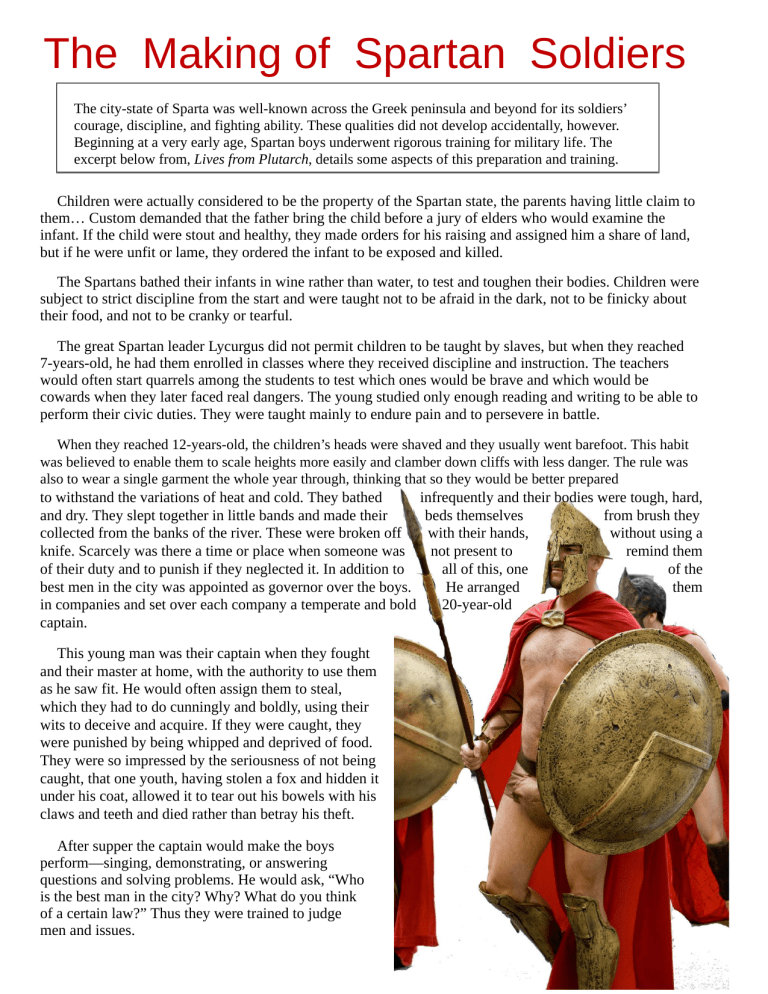
The Making of Spartan Soldiers The city-state of Sparta was well-known across the Greek peninsula and beyond for its soldiers’ courage, discipline, and fighting ability. These qualities did not develop accidentally, however. Beginning at a very early age, Spartan boys underwent rigorous training for military life. The excerpt below from, Lives from Plutarch, details some aspects of this preparation and training. Children were actually considered to be the property of the Spartan state, the parents having little claim to them… Custom demanded that the father bring the child before a jury of elders who would examine the infant. If the child were stout and healthy, they made orders for his raising and assigned him a share of land, but if he were unfit or lame, they ordered the infant to be exposed and killed. The Spartans bathed their infants in wine rather than water, to test and toughen their bodies. Children were subject to strict discipline from the start and were taught not to be afraid in the dark, not to be finicky about their food, and not to be cranky or tearful. The great Spartan leader Lycurgus did not permit children to be taught by slaves, but when they reached 7-years-old, he had them enrolled in classes where they received discipline and instruction. The teachers would often start quarrels among the students to test which ones would be brave and which would be cowards when they later faced real dangers. The young studied only enough reading and writing to be able to perform their civic duties. They were taught mainly to endure pain and to persevere in battle. When they reached 12-years-old, the children’s heads were shaved and they usually went barefoot. This habit was believed to enable them to scale heights more easily and clamber down cliffs with less danger. The rule was also to wear a single garment the whole year through, thinking that so they would be better prepared to withstand the variations of heat and cold. They bathed infrequently and their bodies were tough, hard, and dry. They slept together in little bands and made their beds themselves from brush they collected from the banks of the river. These were broken off with their hands, without using a knife. Scarcely was there a time or place when someone was not present to remind them of their duty and to punish if they neglected it. In addition to all of this, one of the best men in the city was appointed as governor over the boys. He arranged them in companies and set over each company a temperate and bold 20-year-old captain. This young man was their captain when they fought and their master at home, with the authority to use them as he saw fit. He would often assign them to steal, which they had to do cunningly and boldly, using their wits to deceive and acquire. If they were caught, they were punished by being whipped and deprived of food. They were so impressed by the seriousness of not being caught, that one youth, having stolen a fox and hidden it under his coat, allowed it to tear out his bowels with his claws and teeth and died rather than betray his theft. After supper the captain would make the boys perform—singing, demonstrating, or answering questions and solving problems. He would ask, “Who is the best man in the city? Why? What do you think of a certain law?” Thus they were trained to judge men and issues. From The Greek Historians, Vol 21. By Francis Godolphin (1942) Name ___________________________ The Making of Spartan Soldiers 1. What was the role of education in Spartan society? To produce and maintain a powerful army. 2. How does a Spartan education differ from other education systems you know about? The purpose of education in Sparta was to produce and maintain a powerful army. 3. In what ways did this benefit Sparta? ● ● ● ● Strong land army, protection. Sparta advantage. Women could own property. Sparta advantage. Women had freedom. Sparta advantage. Strength/training. Sparta advantage. 4. In what ways would this lifestyle hurt the Spartans? 5. What was the purpose of having the boys steal? 6. What shocked you the most about Spartan society? 7. How do you think you would feel about being raised in Sparta? 8. What do you think a Spartan would have to say about what you learn in school each day?







